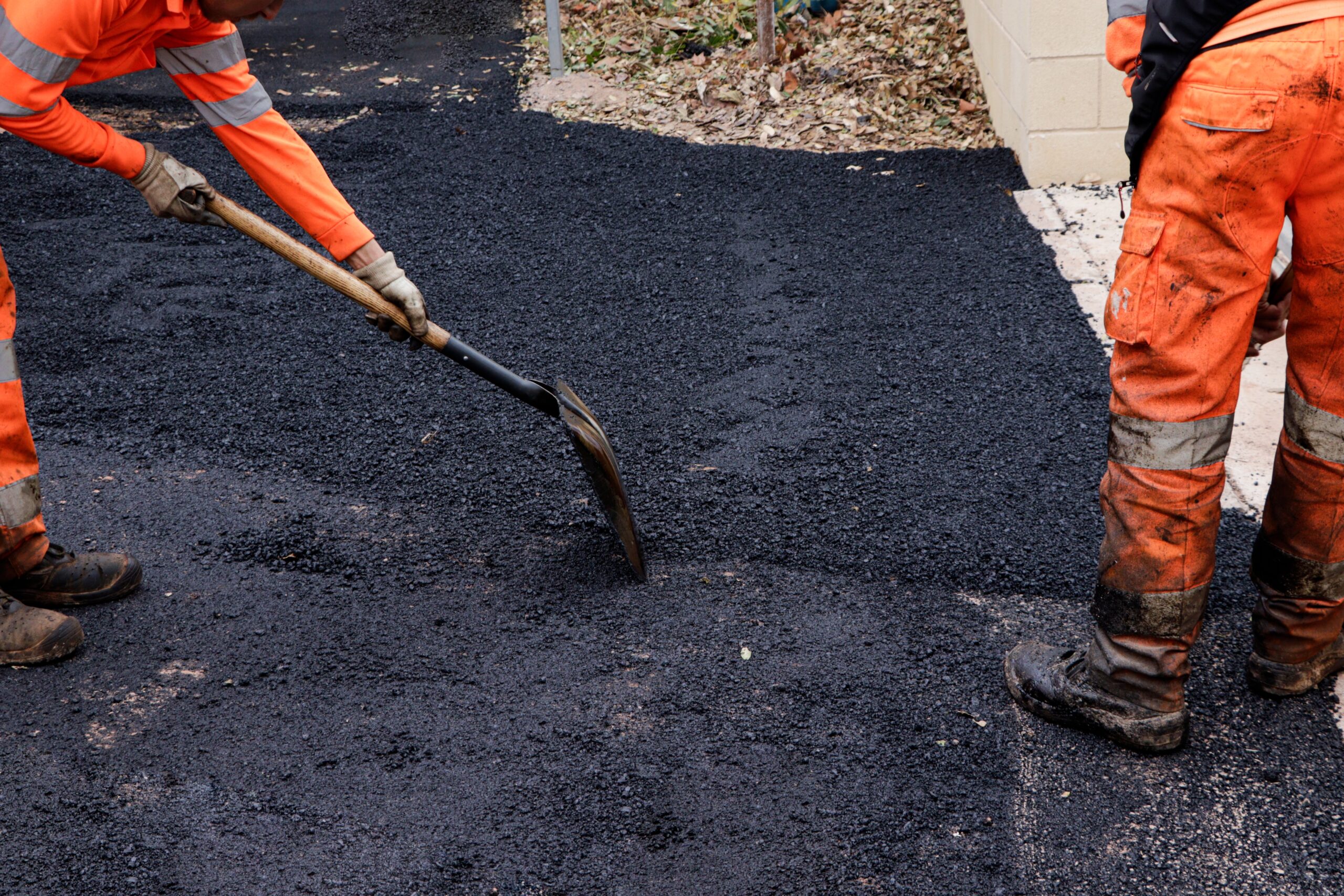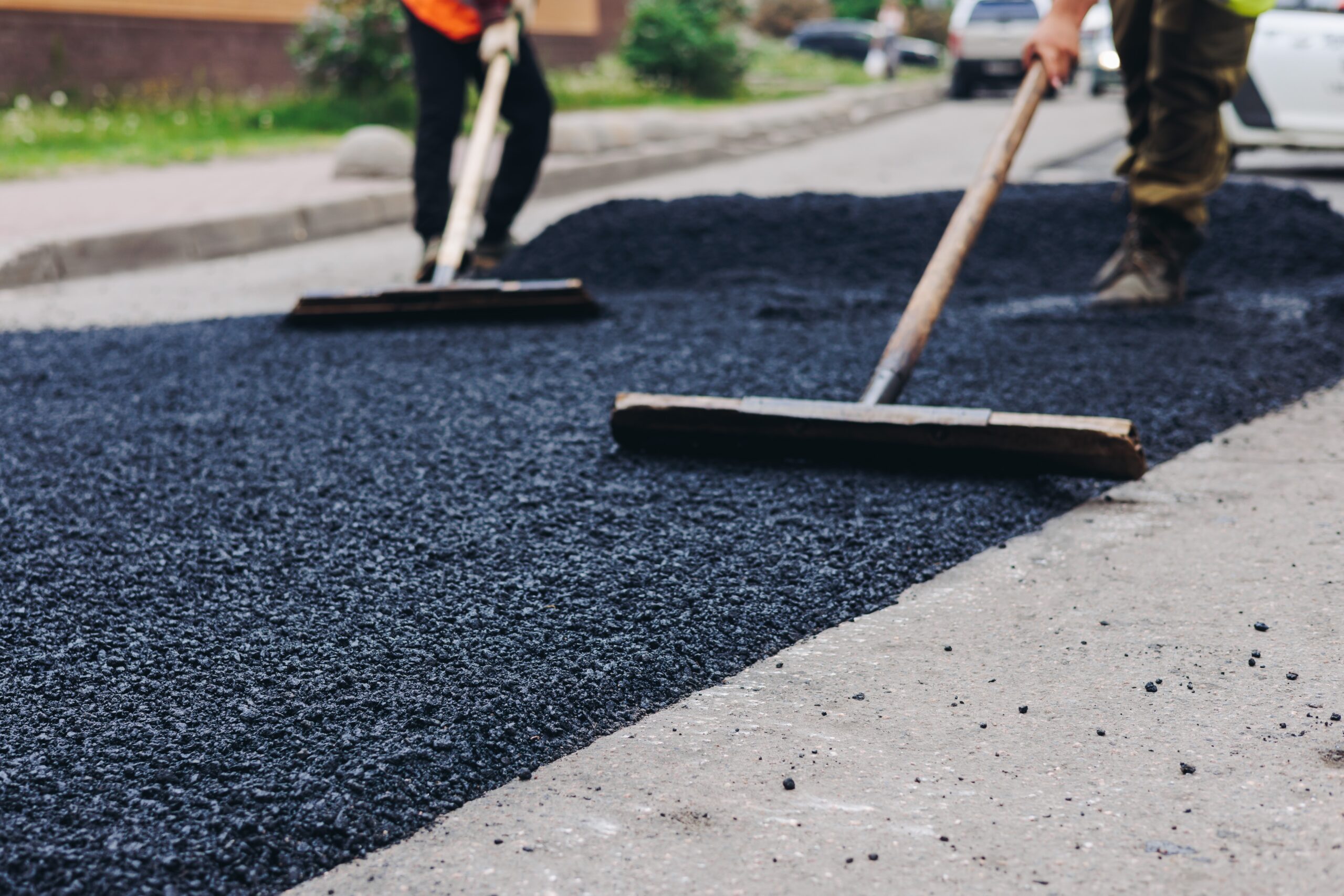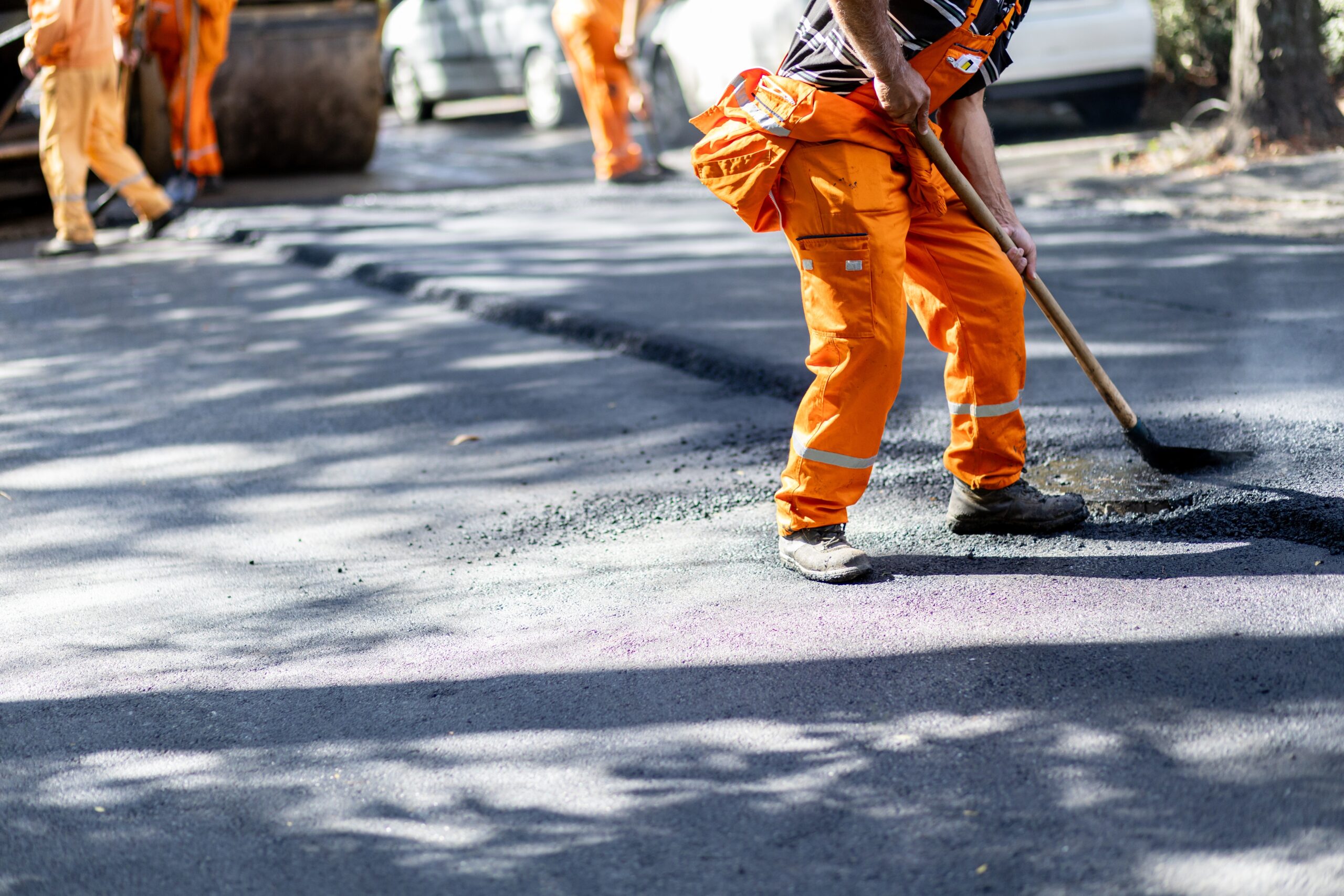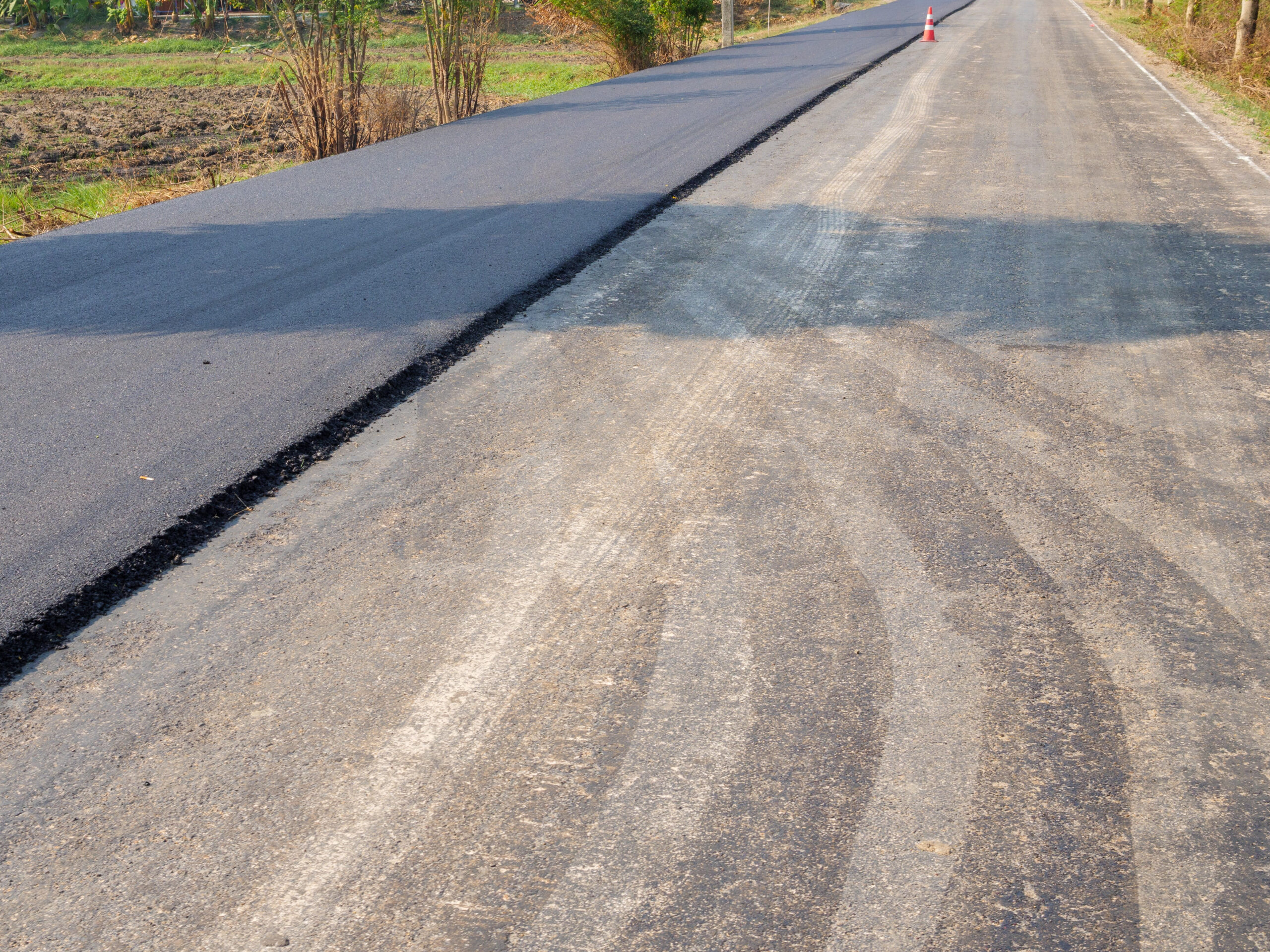Asphalt repair and repaving are crucial for maintaining parking lots and roadways that are safe, durable, and cost-effective. However, beyond the type of treatment you choose, the time of year you schedule the work plays a crucial role in determining its duration. Temperature, moisture, and seasonal weather patterns directly affect how asphalt cures and performs.

According to a Federal Highway Administration study, environmental factors, particularly freeze-thaw cycles, significantly contribute to pavement deterioration. The study found that, over 15 years of service under regular traffic, flexible pavements (like asphalt) had 36% of their damage attributed to environmental causes. In contrast, rigid pavements had 24% due to the same reason.
In this guide, we’ll cover the best seasons for asphalt work, discuss why winter is problematic, and provide guidance on planning projects for maximum efficiency, safety, and long-term value.
Why Timing Matters for Asphalt Work
Asphalt’s performance depends heavily on placement temperature. According to a 2024 NAPA study on Warm-Mix Asphalt (WMA) usage, 69% of surveyed agencies already allow production of asphalt at temperatures below the traditional Hot-Mix Asphalt (HMA) minimum of 285°F.
Lower placement temperatures help reduce thermal stress and extend the paving season, making it essential to schedule asphalt work when such technologies can be effectively utilized.
Planning asphalt repairs without closing your business during late spring through early fall in Colorado maximizes the benefits of these lower-temperature mixes, which improve compaction, reduce energy use, and ensure long-term pavement strength.
The Ideal Season for Asphalt Repaving
The best time to repave asphalt is typically late spring through early fall. During this period, temperatures are warm enough to keep the asphalt mix workable and ensure proper compaction.
- Minimum temperature needs: Asphalt requires ground and air temperatures of at least 50°F to cure effectively.
- Summer advantages: Longer days and higher temperatures enable contractors to work efficiently, ensuring the asphalt bonds tightly.
- Fall considerations: Early fall is still suitable in Colorado, but projects should be completed before temperatures begin to dip below recommended curing levels.
By scheduling repaving during this window, property managers ensure stronger pavement that resists cracking and rutting, avoiding the costly choice between overlay vs replacement.
When to Schedule Asphalt Repairs
Not all asphalt projects require complete repaving. More minor repairs can be scheduled strategically throughout the year to maximize durability.
1. Spring: Crack Sealing & Pothole Repair
Early spring is the best time to address cracks and potholes. As temperatures rise, sealing prevents water from penetrating the surface during the first freeze-thaw cycles of the year. According to the Federal Highway Administration (FHWA), untreated cracks allow water infiltration that accelerates pavement deterioration and base failure. You can also review the best crack sealing methods to ensure long-lasting protection.
2. Summer: Sealcoating & Surface Maintenance
Summer’s warm, dry conditions are ideal for sealcoating. For example, the Texas Department of Transportation (TxDOT) specifies that sealcoating should only be applied when the air temperature is above 50°F and rising. The pavement surface temperature is above 60°F to ensure proper bonding and performance.
3. Emergency Repairs: Any Season
Safety hazards, such as deep potholes, broken surfaces, or ADA compliance issues, must be repaired immediately, regardless of the season. Temporary fixes can stabilize the surface until permanent repairs are possible in optimal weather.
Why Winter Is a Challenge for Asphalt Projects
Cold weather is the biggest challenge for asphalt paving. When temperatures are too low, the asphalt mix cools rapidly, making it nearly impossible to achieve proper compaction. This results in weak pavement that may crack or ravel within months.
- Temporary fixes: Cold-patch asphalt can be used for short-term repairs in winter, but it’s not a permanent solution compared to a full mill and pave process.
- Moisture risk: Snow, ice, and deicing chemicals add stress to compromised pavement.
- Premature failure: Any paving done in sub-freezing temperatures risks failing long before its intended lifespan.
For this reason, most major repaving projects in Colorado are scheduled outside of the winter months.
Colorado Climate Considerations for Asphalt Projects

Colorado’s climate presents unique challenges:
- Freeze-thaw cycles: Repeated expansion and contraction of water in cracks accelerate pavement breakdown.
- Snow removal: Snow plows and deicing salt cause surface wear and chipping.
- Short paving season: Colorado’s paving season is shorter than warmer regions, making scheduling ahead essential.
By working with local contractors who understand these weather patterns, property managers can ensure projects are completed in optimal conditions.
Planning Asphalt Repairs to Reduce Business Disruption
Timing isn’t just about choosing the right season; it’s also about completing the project with minimal impact on daily operations.
For businesses, office parks, shopping centers, and apartment complexes, maintaining tenant and customer satisfaction during construction is just as important as the work itself.
- Weekend or Off-Hour Scheduling: Many professional contractors offer flexible scheduling options, including evenings, nights, and weekends, to accommodate their clients’ needs. This reduces interference with business hours, customer access, or tenant activities.
- Phased Projects for Large Lots: Big parking areas don’t have to shut down completely. Resurfacing can be done in phases, allowing part of the lot to remain open while work continues on another section. This ensures continued access for vehicles and pedestrians.
- Advance Planning and Early Booking: The busiest time for paving contractors is late spring and summer. By scheduling early in the season, property managers can secure a preferred time slot, avoid delays, and make sure the project is completed before peak traffic or winter weather.
Proper planning not only minimizes disruptions but also helps ensure that the work is done efficiently, safely, and without unexpected interruptions to your business operations.
The Long-Term Value of Choosing the Right Time
Choosing the right season for asphalt work is more than convenient; it’s a wise investment.
- Pavement installed in proper conditions lasts 20-30 years, while poorly timed projects may fail in less than half that time.
- Timely repairs prevent small cracks from turning into costly base failures.
- Freshly repaved lots improve curb appeal and property value while reducing liability risks.
Partner With Colorado’s Asphalt Experts for Long-Lasting Results
Every property is unique, and the right timing for asphalt work depends on site conditions, traffic load, and budget. That’s why choosing a local contractor with experience in Colorado’s climate is so important.
At Asphalt Coatings Company we’ve spent decades helping businesses plan asphalt repairs and resurfacing projects during the optimal weather windows. With in-house crews, advanced equipment, and regional expertise, we deliver pavement solutions that last, save money, and protect your property.

The best time to repair or repave asphalt is during Colorado’s warmer, drier months, typically from late spring to early fall. Scheduling within this window ensures proper curing, resulting in stronger pavement and a service life of decades.
Don’t let minor issues escalate into major expenses. Contact Asphalt Coatings Company today to schedule your asphalt project and secure a safe, durable surface for years to come.
Frequently Asked Questions
1. Can asphalt be installed in the winter?
Only temporary cold-patch repairs can be done in winter. Permanent paving requires warmer temperatures.
2. What temperature is too cold for asphalt paving?
If air or ground temperatures are below 50°F, paving should be delayed until warmer conditions.
3. Does rain affect asphalt paving?
Yes. Rain prevents asphalt from bonding to the base and can cause premature failure.
4. How far in advance should I schedule asphalt work in Colorado?
At least 2-3 months in advance of peak season to secure a contractor’s schedule.
5. Is sealcoating also seasonal?
Yes. Sealcoating should only be applied in warm, dry conditions for best results, typically in the summer in Colorado.



